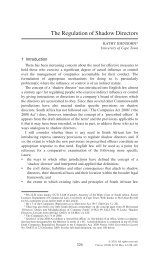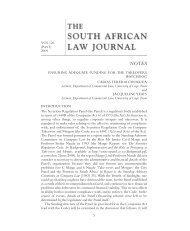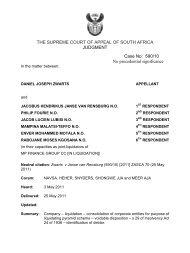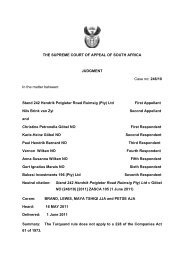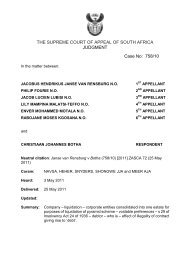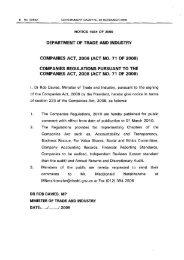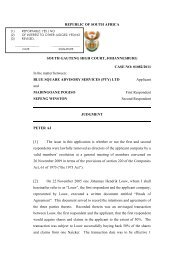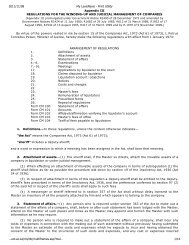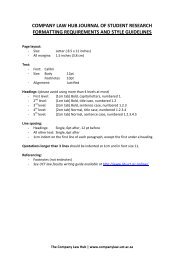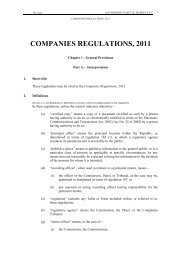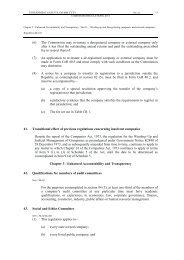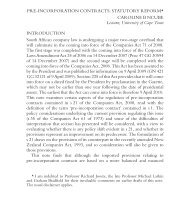Director's Trading in Insolvent Circumstances - Company Law Hub
Director's Trading in Insolvent Circumstances - Company Law Hub
Director's Trading in Insolvent Circumstances - Company Law Hub
You also want an ePaper? Increase the reach of your titles
YUMPU automatically turns print PDFs into web optimized ePapers that Google loves.
Section 76(3) states that a director of a company, when act<strong>in</strong>g<br />
<strong>in</strong> that capacity, must exercise the powers and perform the<br />
functions of a director –<br />
a) <strong>in</strong> good faith and for a proper purpose;<br />
b) <strong>in</strong> the best <strong>in</strong>terests of the company; and<br />
c) with the degree of care, skill and diligence that may<br />
reasonably be expected of a person –<br />
i) carry<strong>in</strong>g out the same functions <strong>in</strong> relation to the<br />
company as those carried out by that director; and<br />
ii)<br />
hav<strong>in</strong>g the general knowledge, skill and experience of<br />
that director.<br />
Section 76(4) states that <strong>in</strong> respect of any particular matter<br />
aris<strong>in</strong>g <strong>in</strong> the exercise of the powers or the performance of the<br />
functions of a director, a particular director of a company will<br />
have satisfied the obligations set out <strong>in</strong> Section 76(3), if the<br />
director has taken reasonably diligent steps to become <strong>in</strong>formed<br />
about the matter.<br />
What would constitute “reasonable diligent steps?” In these<br />
circumstances, a director would be entitled to rely on the<br />
performance and <strong>in</strong>formation provided by persons who have<br />
received delegated powers or authority to perform one or<br />
more of the board’s functions that are capable of delegation<br />
under applicable law. This <strong>in</strong>cludes reliance by the director on<br />
the veracity of the <strong>in</strong>formation provided to such directors. This<br />
would also <strong>in</strong>clude f<strong>in</strong>ancial statements and other f<strong>in</strong>ancial<br />
data prepared by the employees of the company, accountants<br />
or any other professional person reta<strong>in</strong>ed by the company, the<br />
board or any committee constituted by the company. Also<br />
<strong>in</strong>cluded would be matters <strong>in</strong>volv<strong>in</strong>g skills or expertise that the<br />
directors reasonably believe are with<strong>in</strong> the particular person’s<br />
professional expert competence or as to which the particular<br />
person merits confidence. For <strong>in</strong>stance, if a director receives<br />
f<strong>in</strong>ancial <strong>in</strong>formation from departmental managers, he would<br />
be entitled to rely on the veracity of such <strong>in</strong>formation provided<br />
such reliance is “reasonable” <strong>in</strong> the circumstances and when<br />
one considers the specific expertise of that particular director.<br />
For example, the market<strong>in</strong>g director would not have the same<br />
level of <strong>in</strong>sight <strong>in</strong>to a set of management accounts as would the<br />
f<strong>in</strong>ancial director.<br />
Furthermore, <strong>in</strong> terms of Section 76(4) of the Act, a director<br />
would have satisfied the obligations of Section 76(3), if the<br />
director made a decision, or supported the decision of a<br />
committee or the board, with regard to that matter, and the<br />
director had a rational basis for believ<strong>in</strong>g, and did believe, that<br />
the decision was <strong>in</strong> the best <strong>in</strong>terests of the company.<br />
In terms of Section 77(2)(a), a director of a company may be<br />
held liable <strong>in</strong> accordance with the pr<strong>in</strong>ciples of the common law<br />
relat<strong>in</strong>g to the breach of a fiduciary duty, for any loss, damages<br />
or costs susta<strong>in</strong>ed by the company as a consequence of any<br />
breach by the director of duties contemplated, <strong>in</strong>ter alia, <strong>in</strong><br />
Section 76.<br />
Reckless <strong>Trad<strong>in</strong>g</strong>...When Does One W<strong>in</strong>d Up the<br />
<strong>Company</strong> When <strong>Trad<strong>in</strong>g</strong> <strong>in</strong> <strong>Insolvent</strong> <strong>Circumstances</strong>?<br />
Reckless trad<strong>in</strong>g, conduct<strong>in</strong>g the company’s bus<strong>in</strong>ess <strong>in</strong><br />
<strong>in</strong>solvent circumstances or with the <strong>in</strong>tention of defraud<strong>in</strong>g a<br />
creditor are also covered by the new Act. Section 77(3)(b) states<br />
that any director of a company is liable for any loss, damages<br />
or costs susta<strong>in</strong>ed by the company as a direct or <strong>in</strong>direct<br />
consequence of the director hav<strong>in</strong>g acquiesced <strong>in</strong> the carry<strong>in</strong>g<br />
on of the company’s bus<strong>in</strong>ess despite know<strong>in</strong>g that it was be<strong>in</strong>g<br />
conducted <strong>in</strong> a manner prohibited by Section 22(1) of the Act or<br />
has been a party to an act or omission by the company despite<br />
know<strong>in</strong>g that the act or omission was calculated to defraud a<br />
creditor, employee or shareholder of the company or had another<br />
fraudulent purpose.<br />
Section 22(1) states that a company must not carry on its<br />
bus<strong>in</strong>ess recklessly, with gross negligence, with <strong>in</strong>tent to defraud<br />
any person or for any fraudulent purpose; or trade under<br />
<strong>in</strong>solvent circumstances.<br />
In South African <strong>Law</strong>, a director would have a duty to apply for a<br />
company’s w<strong>in</strong>d<strong>in</strong>g up/liquidation (“liquidation”) as soon as he/<br />
she is know<strong>in</strong>gly aware that the company is trad<strong>in</strong>g <strong>in</strong> <strong>in</strong>solvent<br />
circumstances (both factually <strong>in</strong> that its liabilities exceed its<br />
assets, or commercially <strong>in</strong> that the company cannot pay its<br />
debts to creditors as and when they fall due). Consequently, if<br />
a company is trad<strong>in</strong>g <strong>in</strong> <strong>in</strong>solvent circumstances, the directors<br />
of the company would be obligated to file for the company’s<br />
liquidation on an urgent basis. For <strong>in</strong>stance, if a company<br />
cont<strong>in</strong>ues to <strong>in</strong>cur debts, where, <strong>in</strong> the op<strong>in</strong>ion of reasonable<br />
bus<strong>in</strong>essmen stand<strong>in</strong>g <strong>in</strong> the shoes of the directors, there<br />
would be no reasonable prospect of the creditors receiv<strong>in</strong>g<br />
payment when due, it will <strong>in</strong> general be a proper <strong>in</strong>ference that<br />
the bus<strong>in</strong>ess of the company is be<strong>in</strong>g carried on recklessly or<br />
negligently as contemplated by Section 22(1) of the Act.<br />
The tim<strong>in</strong>g of such a liquidation fil<strong>in</strong>g depends on the factual<br />
circumstances of each case and <strong>in</strong> particular the extent of the<br />
f<strong>in</strong>ancial <strong>in</strong>formation available to such director at the relevant<br />
time, but should a director not proceed <strong>in</strong> this manner he/she<br />
might be held personally liable <strong>in</strong> terms of Section 77(3)(b) as<br />
read with Section 22(1) of the Act.<br />
The test will always be that there will come a po<strong>in</strong>t <strong>in</strong> time when<br />
reasonable bus<strong>in</strong>essmen would w<strong>in</strong>d up their company and pay<br />
creditors <strong>in</strong> full, unless they have access to further capital which<br />
can revitalise their company with some appropriate form of<br />
capital reconstruction.<br />
The <strong>in</strong>curr<strong>in</strong>g of credit at a time where directors know that the<br />
company will not be able to meet its liabilities when they fall due<br />
will be tested by the court <strong>in</strong> order to substantiate that a director<br />
should have placed the company <strong>in</strong>to liquidation at that time<br />
and not cont<strong>in</strong>ued to do bus<strong>in</strong>ess know<strong>in</strong>g full well that such<br />
company would never be able to satisfy its creditors.<br />
The detail of f<strong>in</strong>ancial <strong>in</strong>formation available to a director,<br />
together with the veracity of such <strong>in</strong>formation, will be taken<br />
<strong>in</strong>to account when the personal liability of such director is<br />
exam<strong>in</strong>ed <strong>in</strong> terms of section 77 of the Act. Obviously if a<br />
director is <strong>in</strong> charge of operations, he will not be expected to be<br />
privy to the same level of f<strong>in</strong>ancial <strong>in</strong>formation as the f<strong>in</strong>ancial<br />
director.<br />
Defences Available to Directors<br />
The Act does make provision for directors to raise “honest or<br />
reasonable” behaviour on their part to be a defence <strong>in</strong> these<br />
circumstances. Section 77(9) states that <strong>in</strong> any proceed<strong>in</strong>gs<br />
aga<strong>in</strong>st a director, other than for willful misconduct or willful<br />
breach of trust, the court may relieve the director, either wholly<br />
or <strong>in</strong> part, from any liability set out <strong>in</strong> this section, or on any<br />
terms the court considers just, if it appears to the court that the<br />
director has acted honestly and reasonably, or hav<strong>in</strong>g regard to<br />
all the circumstances of the case, <strong>in</strong>clud<strong>in</strong>g those connected with<br />
the appo<strong>in</strong>tment of the director, it would be fair to excuse the<br />
director.



